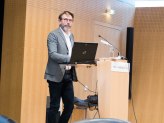Last Friday, the 3rd OS ConJunction Students and Alumni Day took place at the Haus der Begegnung in Innsbruck. As the title already gives away, this year’s event was all about values.
After a theoretical introduction by Richard Weiskopf, where he gave an overview on “The Value of Values in Organizing”, the panel discussion related theory to organizational praxis.
In a vivid discussion, the panelists Stephan Laske (Transformation Management AG), Tabea Ebel (Lebenshilfe Tirol), Ursula Randolf (BTV) and Konrad Frank (Accenture) shared interesting insights on the role of values in their respective organizations. Continue reading “Looking back at the OS ConJunction Students and Alumni Day 2018: “The Value of Organizing and the Organization of Value(s)””










